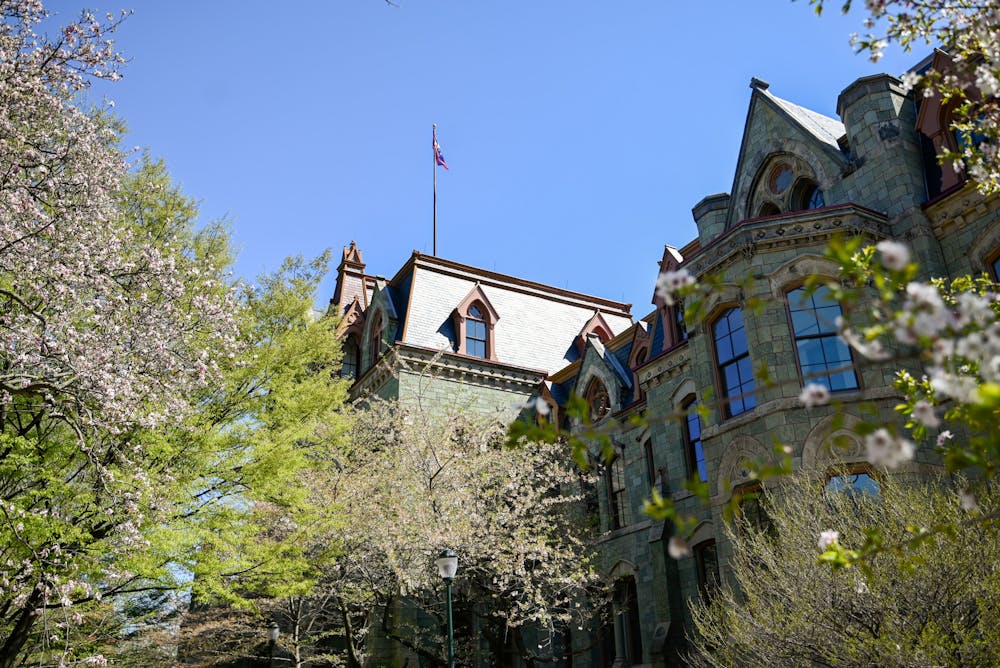
College Hall on April 9.
Credit: Jean ParkPenn's Faculty Senate recently hosted an event with the Kleinman Center for Energy Policy to address concerns over the future of higher education.
The April 9 event titled “Higher Education Under Siege: The Future of the Four-Year Degree" and moderated by Provost John Jackson invited panelists with various experiences and perspectives to discuss the future of higher education as institutions become increasingly politicized. Hosted in the Fisher Fine Arts Library, the event brought together around 40 attendees.
University of Pennsylvania Carey Law School professor and event organizer Eric Feldman began the discussion with an introduction.
"We are living in uniquely challenging times for higher education, whether one celebrates the disruptions that we're experiencing on our campuses or decries what they see as an appropriate political intrusion," he said at the event. "We're clearly confronting a moment of profound transition, a moment where some see unique opportunities and others difficult questions."
Cathy Davidson, a distinguished professor of various disciplines and the founding director of Futures Initiative, highlighted the shared perspective — the value of higher education — that brought the diverse group of panelists together.
“All higher education does something that's kind of miraculous," she said. "[It] takes our society’s responsibility for turning people who have not yet reached the age of authority, and turns them into adults.”
Panelists continued this conversation by describing college and university life as a “rich environment” that students need as an integral part of their development.
“We need to be thinking about what colleges and universities are doing well, what we can do better, and why we have lost the confidence of the public,” Feldman said in a statement to The Daily Pennsylvanian. “We must consider other ways in which these institutions can be configured, what the future holds for government funding of medical and scientific research, and if there are new and better ways of constructing a core curriculum,” he added.
On the subject of "free speech” and “academic freedom,” Davidson referenced former 2022 College Ph.D. graduate Leah Barlow, a current professor at North Carolina Agricultural and Technical State University.
After being assigned to teach "Introduction to African American Literature,” Barlow brought her curriculum to TikTok, filming short-form lectures and other educational material to share. After putting her syllabus online and providing an introductory lecture, Barlow received nearly a million sign-ups for her course.
While Davidson believes higher education is under attack, she notes Barlow’s actions as one of the “resistances to the siege … and power and optimism and hope that may not be the conventional ones that we're thinking of.”
The conversation then shifted to changes in diversity, equity, and inclusion policies and how universities can maintain open arms to students of various identities. Panelists shared their frustrations with reversals in DEI policies and how they may impact students.
Over the past few months, Penn has rolled back DEI initiatives at the University in response to executive action from 1968 Wharton graduate and President Donald Trump. In March, Wharton's DEI major and concentration were renamed to Leading Across Differences.
Barbara Snyder, a former Case Western Reserve University president, shared her thoughts on the shift at Wednesday's event.
“We know that in order for students to thrive, they need to feel a sense of belonging,” she said at the event. “If everybody truly owns that responsibility to ensure that students feel a sense of belonging … it leads to remarkable success stories,” she added.
The Daily Pennsylvanian is an independent, student-run newspaper. Please consider making a donation to support the coverage that shapes the University. Your generosity ensures a future of strong journalism at Penn.
Donate







